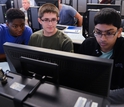
Research News
Program reaches 1,400 middle- and high-school students across the nation
September 9, 2015
In the battle for cyberspace, the U.S. needs as many well-trained, ethically responsible cybersecurity experts as possible.
Many colleges teach courses and have started programs focusing on cybersecurity, but if students don’t fully understand what a career in that field looks like, they are unlikely to major in those programs.
GenCyber, a summer camp jointly developed and supported by the National Science Foundation (NSF) and the National Security Agency (NSA), introduces middle- and high-school students to the basics of cybersecurity, providing mentorship and diverse role models and helping them form communities of young cybersecurity experts.
“Our vision for the GenCyber program is to be part of the solution to the nation’s shortfall of skilled cybersecurity professionals,” said Victor Piotrowski, a program director at NSF. “Ensuring that enough young people are inspired to direct their talents in this area is critical to the future of our country’s national and economic security as we become ever more reliant on cyber-based technology in every aspect of our daily lives.”
Six camps, with a total of approximately 30 teachers and 265 students, participated in a pilot version of the program in 2014. This year, 29 universities in 19 states hosted 43 camps on their campuses. Completely free, they attracted 1,400 participants, half of whom were female–an impressive ratio given that women represent only 18 percent of computing students and 11 percent of cybersecurity professionals.
Since 2001, NSF has operated a cybersecurity program serving undergraduate and graduate students called CyberCorps®: Scholarship for Service (SFS). Selected students receive scholarships and make a commitment to work for the government for a period of time after graduating from the program.
GenCyber expands on the goals of the CyberCorps program and serves as a way to get younger students interested in and informed about careers in computer science and security. Through hands-on activities in the lab, lectures from teachers, college professors and undergraduate students, and field trips to see cybersecurity in practice, GenCyber allows students to learn to explore the field before they enter college.
In the camps, students learn how to monitor networks and identify vulnerabilities that can lead to intrusions or cyberattacks. Perhaps as important, they learn that there is nothing “weird” or “nerdy” about being interested in cybersecurity.
“This kind of program–for the younger kids, the high-school kids–gives them an opportunity to explore areas that they may only have heard about peripherally but never had a chance to get some good hands-on content in,” said Darrell Andrews, a business education and technology teacher at Bishop O’Connell High School and a GenCyber camp instructor.
Diane Murphy, professor and chair of the Information Technology Department at Marymount University in Arlington, Va., serves as head of the school’s GenCyber. She said the program gives students with an inclination toward cybersecurity the rare opportunity to learn in an environment where that sort of interest is the norm.
“It’s been really interesting to watch cybersecurity professionals grow,” she said. “Very often the students might be in a school where computing and cybersecurity is more a minority-type thing. Here they’re amongst their peers and I think that’s an important piece of the puzzle–to understand that there are other people like you.”
At Marymount, professors and high-school teachers jointly instructed a class of 32 students, who lived on-campus and interacted with undergraduates majoring in cybersecurity.
Students in the camp used open-source software tools like Wireshark and Nmap to analyze packet transmissions and map networks. A key requirement of the program is teaching students about ethical behavior in cyberspace. To this end, students hear about real-life hackers–both good and bad–along with the laws governing hacking and cybersecurity, and the results of malicious hacking.
“It’s a learning experience for them to learn about the consequences of black hat hacking,” Murphy said.
From forensics to field trips
Each program at the 29 universities is unique, focusing on different age groups, using different curricula and teaching via different mechanisms–some in person and some virtual. All curricula, exercises and activities developed for the GenCyber camps are available to the community.
At New York University (NYU) Polytechnic School of Engineering, GenCyber introduced 75 high-school girls to programming, ethical hacking and digital forensics during intensive, two-week-long programs.
Claire Dalkie, a student who participated in the GenCyber camp at NYU, identified a trip to Google headquarters as a highlight.
“I’ve always loved technology and programming,” she said, “and GenCyber opened my eyes to the possibility of a whole new field.”
GenCyber camps often include teacher development as a key component. At NYU, teachers taking part in the program are expected to develop and deploy cybersecurity programs at their own schools.
Many will also return to their classrooms prepared to coach teams for Cyber Security Awareness Week (CSAW), which takes place each year at NYU’s School of Engineering, and other similar programs. The largest student-run cybersecurity event in the nation, CSAW includes such competitions as Capture the Flag, the Embedded Security Challenge and High School Forensics.
“NSF supports evidence-based STEM education projects, and GenCyber allows us to investigate types of activities, pedagogy, evaluation metrics and other factors of innovative projects to increase diversity and interest in cybersecurity careers,” said Piotrowski, who serves as the lead program director for NSF’s CyberCorps program.
NSF invests almost $50 million annually in cybersecurity education and workforce development, including $45 million in the CyberCorps program. The program maintains more than 170 active projects around the country.
In addition to the projects that provide scholarships for students, CyberCorps supports informal learning projects that design and evaluate sport-like environments for cybersecurity such as cyber gyms with coaches and mentors, the National Cybersecurity Sports Federation–which aims to create an umbrella organization for cybersecurity competitions–and state-sponsored “cybersecurity cup challenges.”
“Cybersecurity is a dynamic and evolving field, and the country needs talented people with the skills to protect U.S. interests around the world,” Piotrowski said. “Through the CyberCorps program, we prepare students for rewarding careers in public service and increase the capacity of institutions to offer quality course work in this area.”
—
Aaron Dubrow,
NSF
(703) 292-4489 adubrow@nsf.gov
-
The GenCyber camps attracted 1,400 participants, of whom 50 percent were female.
Credit and Larger Version -
GenCyber camps introduce middle- and high-school students to the basics of cybersecurity.
Credit and Larger Version
Investigators
Nasir Memon
Diane Murphy
Related Institutions/Organizations
New York University
Marymount University
Locations
New York
, New York
Arlington
, Virginia
Related Programs
CyberCorps(R) Scholarship for Service
Related Awards
#1241568 Building Cyber Security Capacity in Two Year and Four Year Colleges
#1241440 Preparing Professionals for Cybersecurity in the Government: Scholarships for Service
Years Research Conducted
2014
– 2017
Total Grants
$3,029,166
Related Agencies
National Security Agency
Related Websites
GenCyber: http://www.gen-cyber.com/
CyberCorps: Scholarship for Service (SFS): https://www.nsf.gov/funding/pgm_summ.jsp?pims_id=5228
Source: NSF News
Brought to you by China News









